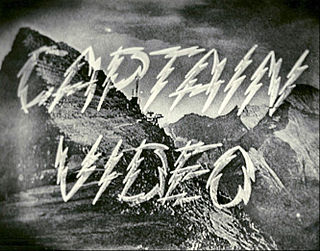
The DuMont Television Network was one of America's pioneer commercial television networks, rivaling NBC and CBS for the distinction of being first overall in the United States. It was owned by Allen B. DuMont Laboratories, a television equipment and television set manufacturer, and began operation on April 13, 1940.
Mary Kay and Johnny is an American sitcom starring real-life married couple Mary Kay and Johnny Stearns. It was the first sitcom broadcast on a television network in the United States. Mary Kay and Johnny initially aired live on the DuMont Television Network before moving to CBS and then NBC.

The Ernie Kovacs Show is an American comedy show hosted by comedian Ernie Kovacs, first shown in Philadelphia during the early 1950s, then nationally. The show appeared in many versions and formats, including daytime, prime-time, late-night, talk show, comedy, and as a summer replacement series.

Captain Video and His Video Rangers is an American science fiction television series that aired on the DuMont Television Network and was the first series of its genre on American television.

Life Is Worth Living is an inspirational American television series which ran on the DuMont Television Network from February 12, 1952, to April 26, 1955, then on ABC until April 8, 1957, featuring the Archbishop Fulton J. Sheen. Similar series, also featuring Sheen, followed in 1958–1961 and 1961–1968.
The following is the 1954–55 network television schedule for the four major English language commercial broadcast networks in the United States. The schedule covers primetime hours from September 1954 through March 1955. The schedule is followed by a list per network of returning series, new series, and series cancelled after the 1953–54 season.

You Asked for It is a human interest television show created and hosted by Art Baker. Initially titled The Art Baker Show, the program originally aired on American television between 1950 and 1959. Later versions of the series were seen in 1972, 1981, and 2000.
The following is the 1953–54 network television schedule for the four major English language commercial broadcast networks in the United States. The schedule covers primetime hours from September 1953 through March 1954. The schedule is followed by a list per network of returning series, new series, and series cancelled after the 1952–53 season.

The Wendy Barrie Show is an American talk show hosted by Wendy Barrie, which aired from November 10, 1948, to September 27, 1950.
The NFL on DuMont was an American television program that broadcast National Football League games on the now defunct DuMont Television Network. The program ran from 1951 to 1955.
Down You Go is an American television game show originally broadcast on the DuMont Television Network. The Emmy Award-nominated series ran from 1951 to 1956 as a prime time series primarily hosted by Dr. Bergen Evans. The program aired in eleven different timeslots during its five-year run.
Play the Game, also known as Let's Play the Game, was one of the earliest game shows to be broadcast over an American television network, and the first known example of a television panel show. In 1941-42, CBS aired an early game show, CBS Television Quiz.
Youth on the March is an American religious television program originally broadcast on ABC from October 1949 to May 1952, and by the DuMont Television Network from October 1952 to June 1953. The show was presented by the Young People's Church of the Air, and included religious songs and instruction for children and teens.
Better Living TV Theater is an American television documentary program originally broadcast on ABC and later on the DuMont Television Network. The documentary series, featuring moderator Fischer Black, debuted on June 20, 1953. The ABC version was a summer replacement series which aired on Sunday afternoons. The final ABC broadcast occurred on August 16, 1953.
Happy's Party was a children's TV program originating at WDTV in Pittsburgh, Pennsylvania and broadcast for one season on the DuMont Television Network.
Kids and Company is an American children's TV show that aired on the now-defunct DuMont Television Network on Saturday mornings from September 1, 1951 to May 2, 1953 and was hosted by Johnny Olson and Ham Fisher. The series was primarily sponsored by Red Goose Shoes.
Chance of a Lifetime is an American television competitive talent show that began on ABC on September 6, 1950, and aired on ABC and DuMont between 1952 and 1956.

Jerome Coopersmith was an American dramatist known for television, theater, and his work as a professor of screenplay writing. Working in the television industry since 1947, Coopersmith authored more than 100 television scripts for anthology dramas, episodic series and television movies and specials. His television work included Johnny Jupiter (1953-1954), Armstrong Circle Theater (1955–1963), Hawaii Five-O (1967–1976), and Streets of San Francisco (1973), and the holiday classics 'Twas the Night Before Christmas (1974) and An American Christmas Carol (1979). Coopersmith's theatrical plays span Broadway, off-Broadway, and regional productions. His Broadway musical, Baker Street (1965), based on the stories of Sherlock Holmes, earned him a Tony Nomination as Author of Best Musical. He was a member of the Dramatists Guild, the Mystery Writers of America, and was a member and past officer of the Writers Guild of America, East. On November 12, 2019, at age 94, Coopersmith was honored with the highest distinction of Chevalier, or Knight, in the National Order of the French Legion of Honor in recognition of his service to France in World War II.







